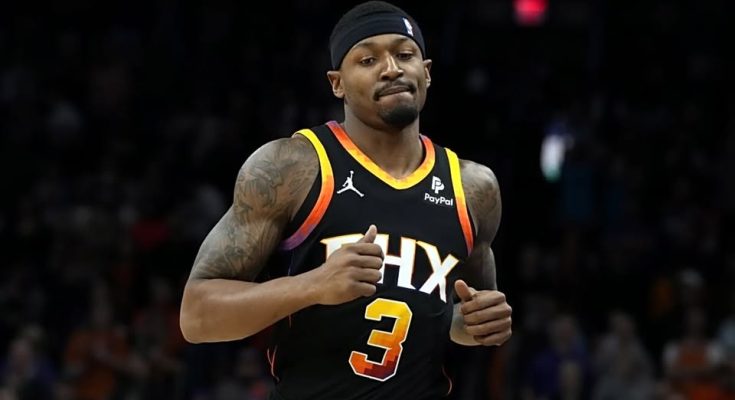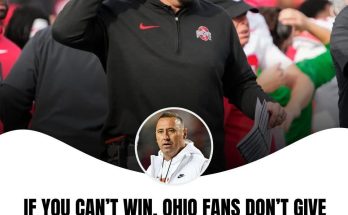When news broke that the Golden State Warriors had reportedly offered Bradley Beal a minimum contract during the 2024 NBA offseason, the basketball world was stunned. This was not just another mid-summer rumor — it was a spark that lit a firestorm of debate. Was this move a slap in the face to a respected veteran and three-time All-Star? Or was it a calculated, perhaps even shrewd, front-office maneuver rooted in fiscal strategy and long-term planning? The timing, the optics, and the silence that has shrouded the Warriors’ offseason only deepen the intrigue. In the ever-evolving chessboard of the NBA, such decisions are rarely simple, and the offer to Beal may signal more than just a tone-deaf miscalculation — it might represent a new era of aggressive, cap-conscious asset management in San Francisco.
Bradley Beal, who was traded to the Phoenix Suns in 2023 after spending his entire career with the Washington Wizards, has long been viewed as one of the league’s most potent offensive weapons. A career 22-point-per-game scorer with multiple 30+ PPG seasons under his belt, Beal was once considered a franchise cornerstone. But his recent seasons have been marred by injuries, and questions surrounding his defensive effort and fit within high-level playoff basketball have grown louder. The Suns, hoping to form a superteam nucleus with Kevin Durant and Devin Booker, failed to meet expectations, exiting the playoffs early and sparking whispers of potential disbandment.
The Warriors, meanwhile, found themselves at a crossroads. After missing the playoffs in 2024 and seeing their core of Stephen Curry, Klay Thompson, and Draymond Green continue to age, the organization is facing a painful reckoning. They are operating under the restrictions of the second apron of the luxury tax, a punitive measure in the new CBA that harshly penalizes teams spending significantly above the cap. The financial handcuffs are real — limiting their ability to add talent via traditional free agency or sign-and-trade. The result is a necessity to explore creative, often uncomfortable, options. That brings us to Beal.
To the casual observer, offering a minimum deal to someone of Beal’s pedigree might appear insulting. It’s not just a lowball offer — it’s the kind of proposal typically extended to fringe veterans looking to chase a ring at the end of their careers, not a player still in his early 30s with plenty of gas left in the tank. But in the high-stakes world of NBA roster construction, value is everything. The Warriors, strapped for cash and desperate to add scoring punch alongside Curry, likely saw Beal as a potential buy-low candidate — someone whose recent struggles might depress his market value but who, in the right situation, could re-emerge as a difference-maker.
Still, context matters. Beal’s existing contract with the Suns is no small deal; he’s owed over \$150 million through 2027. If he were to be waived and became a free agent — a scenario not completely far-fetched given Phoenix’s tax burdens and need for flexibility — then teams like Golden State could swoop in. That scenario was purely hypothetical at the time of the offer, but even floating the minimum deal out there sends a message. It speaks volumes about how the Warriors are evaluating not just Beal, but the entire market of aging stars and former All-NBA players whose contracts no longer align with their output.
But this also speaks to a deeper issue: the changing dynamics of player valuation. Gone are the days when name recognition alone guaranteed a lucrative contract. Today’s NBA values efficiency, durability, and team fit above all. Beal’s declining defensive metrics, inconsistent health, and ball-dominant style — which might conflict with Curry’s off-ball genius — make him a questionable fit for the Warriors’ motion-heavy offense. While he remains a lethal scorer, his presence could disrupt the ecosystem that Golden State relies on for success. In that light, the minimum offer can be interpreted not as an insult, but as a reflection of perceived risk.
What makes this story more dramatic is the Warriors’ recent history with similar players. They’ve consistently shown a willingness to bet on reclamation projects or veterans seeking redemption. From DeMarcus Cousins to Otto Porter Jr., the team has tried to extract value from players whose stock had plummeted due to injury or inconsistency. Some of those moves paid off; others didn’t. But the pattern is clear: Golden State loves a good discount. The Beal offer — while shocking — fits that mold.
Another factor to consider is public relations and player perception. The NBA is as much about relationships and respect as it is about wins and losses. A low-ball offer can tarnish an organization’s reputation among players. Superstars talk, agents whisper, and reputations stick. If Golden State was truly serious about luring Beal, offering the minimum could be seen as starting the conversation in bad faith. If, however, it was merely a feeler — a way of gauging interest or signaling to other agents that the Warriors are open for business — then it serves a different purpose entirely. In negotiation, sometimes you lowball just to open the door. Beal’s reaction, or lack thereof, is telling. He did not respond publicly, and the Suns have not made any comments indicating he would be waived or traded. This silence could mean the situation is more fluid than it appears.
The Warriors’ offseason so far has been uncharacteristically quiet. No big trades, no major free agent signings, and no splashy draft moves. The fanbase is growing restless. With Klay Thompson departing for Dallas, Jordan Poole long gone, and questions about Andrew Wiggins’ consistency, the offensive burden on Curry is heavier than ever. The front office — led by Mike Dunleavy Jr. — is under pressure to make a move, but their options are limited. They are reportedly shopping Chris Paul’s expiring contract, but deals are hard to come by when most teams are either rebuilding or hoarding assets for the next superstar trade.
In that climate, the Beal offer might have been a Hail Mary. A move made out of desperation, or possibly even a bluff designed to create leverage elsewhere. By signaling their interest in a scoring guard, the Warriors may have been trying to nudge other negotiations forward — perhaps with players like Buddy Hield, Spencer Dinwiddie, or even a trade target like Malcolm Brogdon. In the NBA, smoke and mirrors are common tactics. Sometimes a rumor isn’t about the player involved, but about the ripple effect it creates.
Of course, none of this explains why Bradley Beal, a player still capable of putting up 25 points per night, would entertain the idea of playing for the minimum. He probably wouldn’t — unless he’s bought out, takes it personally, and decides to chase a ring out of spite. Or perhaps he views Golden State’s culture, system, and coaching staff as the ideal place to rejuvenate his career and rewrite the narrative surrounding him. Stranger things have happened. After all, the Warriors did manage to convince Kevin Durant to join them in 2016 when they already had a title-contending roster.
Another layer worth examining is how this move fits into the Warriors’ broader strategy post-dynasty. There is a clear philosophical shift happening. For years, Golden State was a juggernaut — built around homegrown stars, brilliant coaching, and elite basketball IQ. But as those stars age and their supporting cast dwindles, the organization must confront the harsh reality of decline. The minimum offer to Beal may be less about him and more about how the team sees its path forward: not by stacking stars, but by identifying undervalued talent that can plug into their system and contribute immediately.
Analytics now rule decision-making across the league, and Beal’s advanced stats over the past two seasons have raised red flags. His defensive win shares are among the lowest for starting shooting guards, and his usage rate often comes at the expense of ball movement. For a team like the Warriors that thrives on pace, space, and constant motion, those numbers matter. They may have offered the minimum because they believe that’s what Beal is currently worth in their specific system — a reality that might be tough to swallow, but not necessarily inaccurate.
Yet, this still doesn’t remove the sting for Beal, or for fans who see this as a blatant show of disrespect. Legacy matters. So does perception. And even if the Warriors’ front office felt the offer was grounded in logic and analytics, the emotional fallout could be significant. Beal may now view Golden State as a franchise that disrespected his value. Other players watching this unfold might wonder if the same thing could happen to them one day. In a league built on trust and relationships, that’s a dangerous precedent.
The story of the Warriors offering Bradley Beal a minimum deal is one that sits at the intersection of strategy and psychology. On one hand, it’s a clever financial maneuver aimed at maximizing value in a tough cap environment. On the other, it’s a potentially tone-deaf misstep that underestimates the importance of respect and reputation. As the offseason drags on and Golden State looks for answers, this moment will be remembered as a flashpoint — a symbol of how far the mighty have fallen and how complicated the road back to relevance will be.
Perhaps the most telling part of this saga is what it reveals about the current state of the NBA. With the new CBA reshaping team-building strategies, and with the margin for error growing ever smaller, teams must now balance hard data with human elements more than ever. Bradley Beal may or may not become a Warrior. The minimum offer may or may not have been serious. But what’s certain is that every move, every rumor, every negotiation carries weight. In this new era, perception can be just as important as performance. And for the Warriors, the line between disrespect and strategy has never been blurrier.



